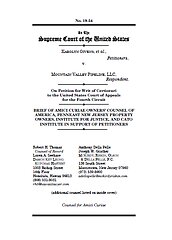Learn more about Cato’s Amicus Briefs Program.
The demand for American energy independence and expansion of the natural gas industry have led to a marked increase in the construction of new gas pipelines. The Natural Gas Act empowers the Federal Energy Regulatory Commission to delegate to private pipeline companies the power to take private property to build these pipelines, so long as they pay the just compensation due under the Fifth Amendment. Not content with the power to begin construction after judicially authorized transfer of title, however, these companies have claimed the equivalent of government power—not mere delegated authority—by taking property before any adjudication by means of preliminary injunctions, with even fewer owner protections than statutory “quick takes” (expedited title transfers).
Karolyn and Clarence Givens had farmed their land for a decade before a pipeline company undertook to construct a 303-mile pipeline from West Virginia to Virginia, including a segment that would cross their property. Since Clarence’s death in 2017, Karolyn has depended on rents from the farm to maintain her income. That income has been jeopardized by an early taking, forcing Karolyn to move her cattle onto a parcel occupied by a current tenant. Like other landowners in the area, Mrs. Givens has expressed concerns over the potential environmental and safety risks posed by the new pipeline. These concerns too have been vindicated as the company’s efforts have left her farm scarred by potholes, erosion, and twisted fencing.
Courts in three federal districts have granted preliminary injunctions allowing for the possession of Givens’s land before a final determination of just compensation, subject to a bond. The U.S. Court of Appeals for the Fourth Circuit upheld these injunctions on appeal.
This case raises questions under the Rules Enabling Act and the Takings Clause of the Fifth Amendment. The Enabling Act provides that the federal rules “shall not abridge, enlarge, or modify any substantive right.” Here the question is whether the substantive right at issue in a government authorized taking carried out by a private company is indeed a transfer of title and enforceable guarantee of just compensation and whether that right is impermissibly expanded by preliminary injunctions. By holding that it is not, the Fourth Circuit found that an injunction bond was able to serve the same role as a quick-take deposit, despite not transferring title from the owner or providing any irrevocable guarantee that the company will ultimately pay court-determined just compensation. The injunctions neither prevent pipeline companies from abandoning their efforts after taking destructive possession of others’ property, nor protect the owner’s right to interest on any difference between the bond amount and final award of just compensation.
Cato now joins the Owners Counsel of America, Penneast New Jersey Property Owners, and Institute for Justice on a brief supporting Karolyn Givens’s petition for Supreme Court review. We argue that preliminary injunctions deprive property owners of their rights to possess and exclude others from their land, without compensation, for a period of time, as well as providing them with constitutionally insufficient guarantees of just compensation for any eventual taking. Should these injunctions be upheld, private companies will continue to be able to occupy property in anticipation of a taking with even fewer guardrails that those present for similar government actions.

This work is licensed under a Creative Commons Attribution-NonCommercial-ShareAlike 4.0 International License.
